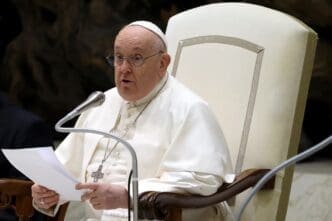Pope Francis, remembered for his profound acts of compassion and humility, passed away on Monday at the age of 88. He was the first Latin American pope and left an indelible mark on the world with his characteristic gestures of love, such as blessing a man with deformities in St. Peter’s Square and washing the feet of a Muslim prisoner. His papacy began with a simple “Buonasera” from the loggia of St. Peter’s Basilica, setting the tone for his approachable and informal leadership.
Francis, known for his focus on outreach to the less privileged and marginalized, died just a day after giving his final public blessing from the same loggia on Easter. He had been battling chronic lung disease and was hospitalized for 38 days with double pneumonia, marking the longest health crisis of his 12-year papacy.
Throughout his time as pope, Francis made significant gestures, such as bringing Syrian refugees from a Greek camp to the Vatican, earning widespread popularity among progressive circles. However, his priorities often drew criticism from conservatives who felt his focus on social issues, including poverty and environmental concerns, overshadowed traditional Catholic doctrine. These tensions escalated with his handling of clergy sexual abuse scandals, notably in Chile in 2018, which tested his leadership and reform efforts.
Pope Francis navigated numerous challenges, including leading the Catholic Church through the COVID-19 pandemic, during which he urged global leaders to reevaluate economic and political systems that exacerbate inequality. His call for unity and compassion during the pandemic highlighted his vision of the Church as a “field hospital” for humanity.
Despite never changing core doctrines, Francis initiated reforms that emphasized mercy and inclusivity. He was notable for his progressive stance on issues like LGBTQ+ rights and the death penalty. He also advanced the role of women within the Church, allowing them to participate in decision-making processes and extending voting rights in Vatican synods.
Francis’ papacy was marked by efforts to address financial corruption within the Vatican and to advocate for the poor and disenfranchised. His economic and environmental teachings were encapsulated in documents like “The Joy of the Gospel” and “Praised Be,” where he criticized global economic systems for exploiting the vulnerable.
Born Jorge Mario Bergoglio in Buenos Aires, he was influenced by his Italian immigrant family and developed a deep connection to the Church at a young age. His early life was marked by health challenges, including the removal of part of a lung, which shaped his empathetic leadership style. Throughout his clerical career, Pope Francis was known for his humility and dedication to serving those in need.
Pope Francis’ tenure was also characterized by efforts to heal the wounds of the Church, particularly regarding historical issues like clergy abuse. Although his approaches sometimes sparked controversy, he remained committed to fostering a Church that welcomes everyone.
As the first pope to take the name of St. Francis of Assisi, he embodied a spirit of simplicity and care for society’s outcasts. His legacy endures as a testament to his vision of a more inclusive and compassionate Church, striving to serve all humanity.








